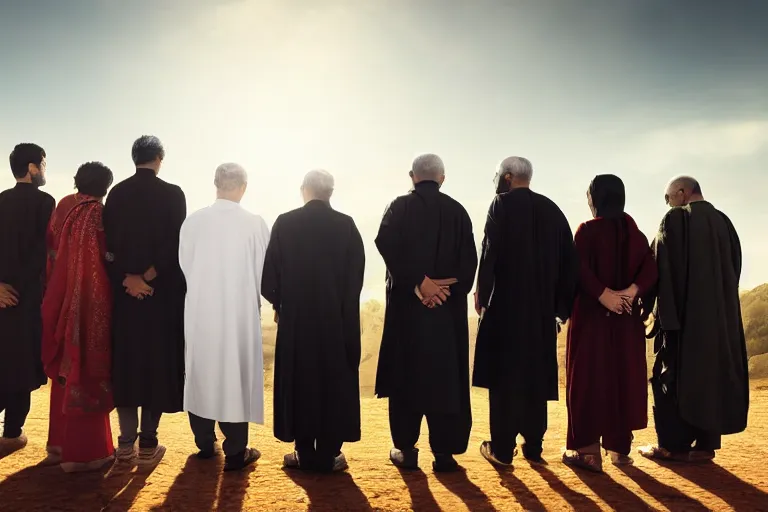Exploring the historical, philosophical, and theological foundations behind the assertion of exclusivity in various religions.
Different religions have emerged throughout human history, each claiming to hold the ultimate truth about existence. This article delves into the reasons why these religions make such claims and examines their justifications from a historical, philosophical, and theological perspective.
The Historical Basis for Claiming Absolute Truth
Imagine each religion as a vast garden, carefully cultivated over centuries by the hands of history and philosophy. Let us delve into the historical basis for claiming absolute truth in these gardens, exploring key figures, texts, and doctrines that have shaped their unique paths.
‘How did these religions begin? What events or individuals laid the foundation for their claims to absolute truth?’
Christianity traces its roots back to Jesus Christ, who is revered as both a divine figure and a mortal man. The New Testament, a collection of writings compiled in the 1st century AD, forms the core scriptures for Christians. These texts detail the life, teachings, and miracles attributed to Jesus, establishing a clear narrative of his divine mission on earth. The early Church Fathers, such as Saint Paul, played pivotal roles in shaping Christian doctrine and expanding its reach across the Roman Empire.
Islam emerged in the 7th century with the Prophet Muhammad receiving revelations through the angel Gabriel. The Koran, compiled during his lifetime, serves as the primary religious text. Muhammad’s life, captured in the Hadith collections, provides guidance on how to live a life pleasing to Allah. The foundational period of Islam saw significant expansion under the Rashidun Caliphs, who established the early Islamic state and spread the faith through both conquest and missionary work.
In Hinduism, the historical roots are complex and multifaceted, with various deities and philosophical schools emerging over millennia. Key texts like the Bhagavad Gita and the Upanishads articulate profound spiritual teachings that have been interpreted in numerous ways by different sects and gurus. The Bhakti movement of the 12th to 16th centuries emphasized devotion as a path to divine realization, significantly influencing the religious landscape.
Buddhism began with Siddhartha Gautama, known as the Buddha, who lived around the 5th century BCE. His teachings were recorded in the Tipitaka, a collection of texts that outline the Four Noble Truths and the Eightfold Path. Over time, Buddhism split into various schools, each offering its unique path to enlightenment, such as Mahayana and Theravada.
‘What makes these religious paths so distinct in their claims to absolute truth?’
Each religion’s historical journey is a testament to the diverse ways humanity has sought to understand the divine. Whether through the crucifixion of Jesus, the revelations of Muhammad, the philosophical insights of Hindu texts, or the teachings of the Buddha, these figures and their followers have created intricate frameworks for belief and practice.
Their historical claims to absolute truth are not just about believing in a particular set of doctrines; they are about understanding life itself. These religions offer maps, guiding principles that help navigate the complexities of existence, providing comfort, direction, and a sense of purpose for their followers.
Philosophical Foundations of Exclusivity
Philosophical arguments often serve as the bedrock upon which religions build their claims to absolute truth. When we delve into these philosophical foundations, we are essentially asking whether these beliefs can stand the scrutiny of rational thought and critical analysis.
Is it possible that one religion has a monopoly on the truth about the nature of God? Could it be that only one path leads to salvation or enlightenment, as many religions assert?
The nature of God, in particular, becomes a cornerstone for philosophical debates. In monotheistic traditions like Christianity and Islam, the concept of an all-powerful, omniscient, and omnipresent deity is often used to justify the exclusivity of their claims. These religions argue that only through faith in their specific deity can one achieve ultimate salvation or eternal life.
In contrast, some Eastern philosophies like Buddhism present a more inclusive view where enlightenment can be achieved through various paths, including those outside traditional religious frameworks. The question then arises: Can the exclusivity of one path truly encompass all possible avenues to spiritual fulfillment?
Is the truth so singular that it cannot accommodate multiple perspectives and experiences?
The concept of salvation or
However, religions like Hinduism offer a more nuanced view where enlightenment can be achieved through various paths—whether through devotion (bhakti), knowledge (jnana), or action (karma). This raises the question: Can one religion truly claim a monopoly on the means to ultimate truth, when other traditions provide equally valid, albeit different, routes?
The philosophical arguments surrounding these concepts are complex and multifaceted. They challenge us to consider whether the absolutism of religious claims can coexist with the diversity of human experience and thought.
Theological Justifications for Exclusivity
Delving into the theological doctrines that underpin each religion’s claim to absolute truth, we must first consider their beliefs about heaven and hell. Imagine these concepts as the ultimate scales that weigh one’s soul, determining its eternal fate. For Christianity, heaven is depicted as a place of pure joy, where believers will spend eternity with God. Is this not seen as an absolute truth, given the promise of eternal life? Conversely, hell represents an endless separation from divine presence—a stark contrast to the blissful existence in heaven. But what about other religions that do not include such binary outcomes?
In Islam, the concept of jannah (paradise) and nar (hellfire) is similarly profound, serving as powerful motivators for moral behavior. However, it’s interesting to note how this belief in eternal rewards and punishments differs from the Buddhist understanding of samsara—the cycle of rebirth where one seeks enlightenment rather than an eternal destination.
The idea of reincarnation, found in Hinduism and some schools of Buddhism, offers a different path to ultimate truth. Here, souls are believed to be reborn into new bodies based on their karma from past lives. The goal is to break free from this cycle and achieve moksha (liberation). This contrasts sharply with the Christian belief in an afterlife where one’s soul either enjoys eternal bliss or faces eternal torment.
Each religion’s approach to these ultimate states speaks volumes about its view of absolute truth. Is heaven just a metaphor for spiritual fulfillment, or is it a literal destination? And how does this impact our understanding of the exclusivity of one’s path to salvation?
The Role of Scripture in Claiming Absolute Truth
The role of scripture in claiming absolute truth is a profound and intricate aspect of many religions, serving as both the bedrock and the compass for believers. In Christianity, the Bible stands as an authoritative text, often cited to support claims of exclusive truth. For instance, passages like John 14:6 where Jesus states, ‘I am the way, the truth, and the life,’ are used to bolster the idea that only through Him can one find true salvation. But how do other religions interpret their scriptures in similar ways?
Islam’s Koran is viewed as the literal word of God, revealed to Muhammad. Verses such as 3:81, ‘This day I have perfected for you your religion and completed My favor upon you and have approved Islam as religion for you,’ are seen as definitive proof that Islam is the only true path. The question then arises: How do these interpretations differ from those in Hinduism or Buddhism?
In Hinduism, the Vedas offer a more nuanced approach to truth, recognizing multiple paths to enlightenment. Yet, scriptures like the Bhagavad Gita emphasize the importance of devotion to Vishnu as the ultimate path. This raises questions about the exclusivity claimed by different texts within the same religion.
Buddhism, while emphasizing personal enlightenment and the Four Noble Truths, does not typically claim a single text as absolute truth in the way that monotheistic religions do. However, texts like the Dhammapada are revered for their wisdom, suggesting a different kind of exclusivity rooted in individual spiritual practices.
These diverse approaches to scripture highlight the complexity and depth of religious claims to absolute truth. Each religion uses its sacred texts not just as literal mandates but as tools for understanding the divine and navigating life’s challenges. The question remains: Can these scriptures be interpreted in a way that respects their diversity while still affirming the validity of each tradition?
By exploring how different religions interpret their scriptures, we gain insight into the multifaceted nature of religious truth claims. This examination reveals not only the unique perspectives of each faith but also the common human quest for meaning and understanding in a world often filled with complexity and uncertainty.
The Impact of Culture on Claims of Absolute Truth
The cultural factors that influence each religion’s claim to absolute truth are as complex and nuanced as the societies they emerged from. How can we understand why some religions assert their path is the only way to salvation, while others embrace multiple paths to the divine? Let’s delve into this with a metaphor: imagine each religion as a lens through which one views the world. Why does one religion’s lens appear clearer and more exclusive than another’s?
Societal norms play a pivotal role in shaping these claims. For instance, in cultures that value tradition and stability, a religion might assert an absolute truth to maintain social order. Conversely, in societies where change is the norm, religions may adopt a more inclusive approach to accommodate diverse beliefs and practices.
- Example: In Hinduism, the concept of Brahman suggests that all paths lead to the same ultimate reality, reflecting a culture’s openness and pluralistic values. Meanwhile, in Christianity, the notion of sola scriptura emphasizes the Bible as the sole authority, rooted deeply in a culture that has historically valued scriptural interpretation.
Values also significantly influence religious claims. A society that prioritizes individual freedom might support a religion that allows for personal spiritual exploration and multiple paths to truth. In contrast, societies emphasizing community and collective responsibility may see value in exclusive truths that bind the community together. This can be seen clearly in Islam’s emphasis on Sharia law and communal worship practices.
The traditions of a culture further reinforce these claims. In Judaism, the practice of following the Torah is not just spiritual but also deeply rooted in historical tradition, making the path to truth appear singular and specific. Similarly, in Zoroastrianism, the concept of Ahura Mazda as the single, all-powerful deity is closely tied to ancient Persian cultural values of order and goodness.
Moreover, the way a religion interacts with other cultures can also influence its claim to absolute truth. In religions that have undergone significant missionary activity or conversion efforts, such as Christianity and Islam, there’s often an emphasis on converting others to a single faith, which reinforces exclusivity. Conversely, in more syncretic traditions like Vajrayana Buddhism, which blends multiple spiritual practices, the notion of absolute truth is less about exclusion and more about inclusion.
So, why do these cultural factors matter? They shape not only how religious claims are made but also how they are received by followers. By understanding these cultural influences, we can better appreciate the diversity in religious beliefs and the complex interplay between culture and faith.
Interfaith Dialogue and the Pursuit of Understanding
Interfaith dialogue is like a bridge that spans the vast distances between different faiths, connecting hearts and minds from diverse backgrounds. How can we build such a bridge when each religion claims to hold the key to absolute truth? The pursuit of mutual respect and understanding becomes even more crucial in today’s interconnected world where conflicts often arise from misunderstandings or misinterpretations.
Imagine two travelers, one from Christianity and another from Islam, journeying through a desert. Each believes they have the map that leads straight to the promised land. But what if there were paths leading out of the desert that offered fresh water and shelter? Wouldn’t it be wiser for them to share their knowledge and find common ground rather than stick rigidly to their own maps?
Interfaith dialogue isn’t just about finding a single truth but recognizing the complexity and richness of multiple perspectives. It’s like inviting different guests into your home, each bringing unique flavors that blend together to create something far more delicious than any one dish alone could be. By engaging in these conversations, we learn not only about others’ beliefs but also about ourselves.
Moreover, interfaith dialogue helps challenge our own prejudices and biases. Just as a gardener prunes away dead branches to let the healthy ones flourish, so too does such dialogue allow us to refine our understanding and strengthen our convictions through constructive criticism and open-mindedness. It’s not about converting others but rather about deepening one’s faith by interacting with those who hold different beliefs.
So why should we engage in interfaith dialogue? Because it can foster a more harmonious society where people of different religions coexist peacefully, respecting each other’s right to believe differently. This is no small feat; think of it as navigating the intricate labyrinth of human diversity with care and compassion. Each step taken together towards mutual respect brings us closer to realizing the potential for a world where our shared humanity binds us more strongly than our differences divide us.
Conclusion
 By understanding the unique aspects of each religion’s claim to absolute truth, we can foster greater interfaith dialogue and promote mutual respect and tolerance among believers.
By understanding the unique aspects of each religion’s claim to absolute truth, we can foster greater interfaith dialogue and promote mutual respect and tolerance among believers.











